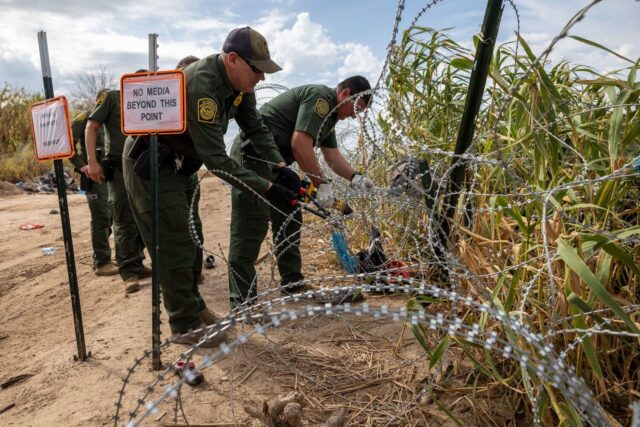
(CNN) — The Supreme Court is allowing US Border Patrol agents to remove razor wire deployed by Texas GOP Gov. Greg Abbott’s security initiative at the US-Mexico border while the state’s legal challenge to the practice plays out.
The vote was 5-4.
The justices’ order is a major victory for President Joe Biden in his ongoing dispute with Abbott over border policy, which had become especially fraught in recent days after three migrants drowned in a section of the Rio Grande that state officials have blocked agents’ access to, prompting the administration to further press for the high court’s intervention.
A federal appeals court last month ordered the Border Patrol agents to stop removing razor wire along a small stretch of the Rio Grande while court proceedings continue, and the Justice Department asked the justices earlier this month to step in on an emergency basis to wipe away that order, which they did on Monday.
Justices Clarence Thomas, Samuel Alito, Neil Gorsuch and Brett Kavanaugh said they would have denied the federal request.
Steve Vladeck, CNN Supreme Court analyst and professor at the University of Texas School of Law, said that while the order is a victory for the Biden administration, the delay in issuing it raises future questions.
“Whatever one thinks of current immigration policy, it ought not to be that controversial that states cannot prevent the federal government from enforcing federal law – lest we set the stage for Democratic-led states to similarly attempt to frustrate the enforcement of federal policies by Republican presidents,” Vladeck said. “That four justices would still have left the lower-court injunction in place will be taken, rightly or wrongly, as a sign that some of those longstanding principles of constitutional federalism might be in a degree of flux.”
White House spokesman Angelo Fernández Hernández told CNN on Monday that the White House was pleased the Supreme Court “vacated the injunction that prevented frontline personnel from performing vital federal functions and interfered with their ability to address urgent humanitarian situations and enforce our laws.”
Andrew Mahaleris, a spokesman for Abbott, said in a statement that the “absence of razor wire and other deterrence strategies encourages migrants to make unsafe and illegal crossings between ports of entry.” He added that the governor “will continue fighting to defend Texas’ property and its constitutional authority to secure the border.”
A spokesperson for the Department of Homeland Security said in a statement that the agency welcomed the high court’s order.
“Enforcement of immigration law is a federal responsibility,” the spokesperson said. “Rather than helping to reduce irregular migration, the State of Texas has only made it harder for frontline personnel to do their jobs and to apply consequences under the law. We can enforce our laws and administer them safely, humanely, and in an orderly way.”
Lawyers for the Biden administration had argued to the Supreme Court that the appeals court ruling “turns … on its head” the Constitution’s Supremacy Clause, which states that federal laws take precedence over state laws.
“The result of Texas’s position would be that States across the country could invoke their laws to impede the federal government’s exercise of its authority,” Solicitor General Elizabeth Prelogar wrote in court papers.
“If that injunction is left in place,” Prelogar stressed, “it will impede Border Patrol agents from carrying out their responsibilities to enforce the immigration laws and guard against the risk of injury and death, matters for which the federal government, not Texas, is held politically accountable.”
In subsequent filings to the high court, Prelogar said that new barriers recently erected by Texas – including new fencing, gates and military Humvees – “demonstrate an escalation” of the state’s efforts to hamstring the government’s border patrol duties and “reinforce” a need for swift intervention in the matter.
She also told the court that Texas was violating a critical part of the injunction that allows federal agents to cut wire to address medical emergencies, arguing that the drownings of two children and a woman earlier this month, as well as the rescue by Mexican officials of two other migrants on the US side of the Rio Grande, “underscore that Texas is firm in its continued efforts … to block Border Patrol’s access to the border even in emergency circumstances.”
The state sued last year to stop Border Patrol agents from cutting the concertina wire, saying it illegally destroyed state property and undermined security in order to assist migrants in crossing the border.
The 5th Circuit is currently weighing the legal questions around whether the federal government has the authority to cut the wire that Texas had installed on the banks of the Rio Grande. It’s set to hear oral arguments in the case February 7.
Texas had urged the Supreme Court to deny the Biden administration’s request, telling the justices in court papers that “there is no basis for this Court’s intervention, much less now.”
Attorneys for the state noted that after the Biden administration filed its emergency request to the justices, the appeals court said it would expedite its review of the case – a decision the state had argued undermined a need for quick action by the nation’s high court.
“In any case, cutting Texas’s fencing to wave thousands of people into Texas has nothing to do with inspection, apprehension, or removal,” Texas Attorney General Ken Paxton and other lawyers for the state wrote in court papers.
“The district court’s findings demonstrate more that (the administration’s) actions are so far removed from what Congress authorized that they have nothing to do with Defendants’ statutory authority,” they told the court.
The White House has repeatedly called on Congress to pass comprehensive immigration reform to address urgent needs at the US-Mexico border. Biden acknowledged to reporters on Friday that the border “is not” secure, calling on lawmakers to “Give me the money!” to fund additional resources.
In Monday’s statement, Fernández Hernández said the president will continue “working to find a bipartisan agreement with Congress that includes additional resources and meaningful policy reforms.”
This story has been updated with additional details.
CNN’s Donald Judd and Priscilla Alvarez contributed to this report.
The-CNN-Wire
™ & © 2024 Cable News Network, Inc., a Warner Bros. Discovery Company. All rights reserved.



























